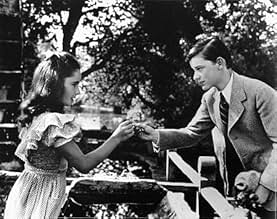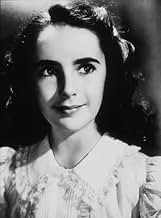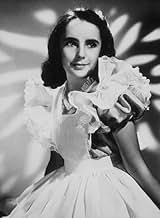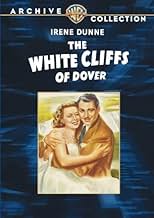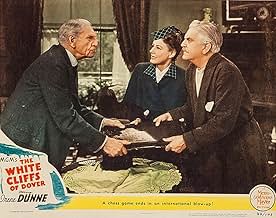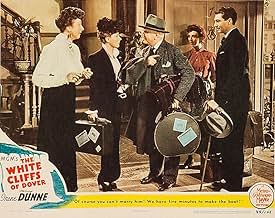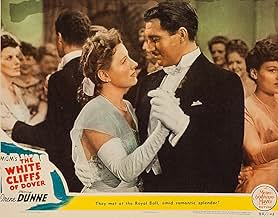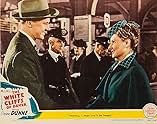AVALIAÇÃO DA IMDb
7,0/10
1,9 mil
SUA AVALIAÇÃO
Susan viaja com o pai para a Inglaterra para passar férias. Convidada para um baile, Susan conhece Sir John Ashwood e se casa com ele após um romance turbulento.Susan viaja com o pai para a Inglaterra para passar férias. Convidada para um baile, Susan conhece Sir John Ashwood e se casa com ele após um romance turbulento.Susan viaja com o pai para a Inglaterra para passar férias. Convidada para um baile, Susan conhece Sir John Ashwood e se casa com ele após um romance turbulento.
- Direção
- Roteiristas
- Artistas
- Indicado a 1 Oscar
- 3 vitórias e 1 indicação no total
May Whitty
- Nanny
- (as Dame May Whitty)
Harry Allen
- English Cabbie
- (não creditado)
Wilson Benge
- Chauffeur
- (não creditado)
Matthew Boulton
- Immigration Officer
- (não creditado)
Edmund Breon
- Major Rupert Bancroft
- (não creditado)
Clifford Brooke
- Indian Major in Boardinghouse
- (não creditado)
Avaliações em destaque
One of the great crimes of the Academy of Motion Picture Arts and Sciences is that Dunne was never given an Oscar....not even an honorary one! Most of her performances transcend time and come off as fresh and natural today as when they were first delivered. She just must have made it look too easy. The woman could do everything! At any rate, this film features another strong performance from her. She plays a young American girl who comes to England with her father (the irascible Morgan) and is soon swept off her feet by dashing and wealthy Marshall. Before they can enjoy any sort of life together, he is called to serve in WWI and they are separated. This is only part of the story as her life unfolds through the next decades and she struggles with letting her son (McDowall, then Lawford) serve in WWII. The film is obviously patriotic and propaganda filled, but understandably so as WWII was still being waged! Dunne is luminescent in the role and is surrounded by a strong array of familiar supporting actors. Notable are Cooper (endlessly watchable in anything!) and Witty (wonderfully crotchety, yet sentimental.) It is a touch jarring to see Taylor grow into Lockhart (young Taylor barely says anything, but "Yes, Sir John".) Lawford is at his most youthful and appealing. The film has a lot of sentiment and melodrama, but also a lot of heart and a little humor. It winds up being quite touching at times and displays a time long gone, but a patriotism that can still be resurrected when events call for it.
This was an incredible War movie which spanned WWI and WWII. It was a romance/drama. Irene Dunne is the female lead who falls in love with and marries a man who soon goes off to fight in France during World War I. He dies and she had his child, a boy.
The boy grows to manhood and is played by Peter Lawford. As the movie ends, Dunne is seeing her son, Lawford go off to fight in WWII. You can see the pain and the pride in Dunne's eyes.
It was a fabulous movie. It dramatizes the great sacrifices made by the British in both World Wars. Britain lost so many of her sons in WWI, I believe the stats were approximately 50% of men between the ages of 18 and 45. The movies points up the fact that the loses, pain and suffering of the English were about to be revisited in WWII.
I can appreciate this and other war movies as I am the mother of a Marine who is about to be sent to Iraq.
The boy grows to manhood and is played by Peter Lawford. As the movie ends, Dunne is seeing her son, Lawford go off to fight in WWII. You can see the pain and the pride in Dunne's eyes.
It was a fabulous movie. It dramatizes the great sacrifices made by the British in both World Wars. Britain lost so many of her sons in WWI, I believe the stats were approximately 50% of men between the ages of 18 and 45. The movies points up the fact that the loses, pain and suffering of the English were about to be revisited in WWII.
I can appreciate this and other war movies as I am the mother of a Marine who is about to be sent to Iraq.
It is almost Christmas 2002, a difficult year for Americans and a perfect time for World War II nostalgia. I was 16 years old when this moviecame out, I am 76 now and "Cliffs" is as fresh today as it was then. The songs, English and American are marvelous, and Irene Dunne shines. Supporting cast is typical of the wonderful character actors of the time plus Elizabeth Taylor. We are moved by an American woman (Dunne) who loses a husband in World War I and a son in World War II. Frank Morgan, who is always Frank Morgan even in the "Wizard of Oz" is marvelous as Dunne's Father. Dame Mae Whittey, Gladys Cooper, Allain Marshall, C. Aubrey Smith as the very British Colonel -- everyone adds to the beauty of this movie, and we must not forget that Irene Dunne is the narrator of the famous poem of World War II, "The White Cliffs of Dover" which is still available in bookstores. I would put this movie in well-done Black and White, right up there with "Thirty Seconds Over Tokyo" (Van Johnson has a bit part in "Cliffs"), "Mrs. Miniver" with Greer Garson, and the magnificent World War 2 Series, "War and Remembrance" and "Winds of War". I am amazed that "black and white" is still effective. I hope this movie is presented as often as "It's a Wonderful Life" every year in the future.
With a title based on a very popular song on both sides of the pond in those World War II years, The White Cliffs Of Dover is seen in flashback by Irene Dunne of her life as an American in Great Britain in the years covering two World Wars. It was one of those hands across the oceans films so popular in those days.
I heard it said that the main fact about the 20th Century that one should realize in studying it is that the United States and Great Britain both spoke a common language. That fact made us overcome a few cultural differences and was the reason America entered two World Wars to save a Great Britain from invasion.
Thus it was for Irene Dunne who came over with her father Frank Morgan on holiday in 1914 and met and married a minor titled fellow played by Alan Marshal. Marshal is killed and she spends a long widowhood raising their son and heir to his title. She lives with her mother-in-law, Gladys Cooper and raises her son who at various times is played by Roddy McDowall and Peter Lawford. The son rather fancies the daughter of one of their tenants played at various times by Elizabeth Taylor and June Lockhart.
Of course this interoceanic love feast has a rather rocky beginning, especially when Frank Morgan while arguing chess with C. Aubrey Smith gets confronted with the fact that the chess board and pieces were the property of the looted White House from the War of 1812. It's my favorite scene in the film.
Dunne who ages gracefully and magnificently gives a stirring performance as a woman who lost what she loved in one war and is ready to sacrifice again for her adopted country. I've a feeling that the folks at MGM might have had her character as an answer to that real female American expatriate, Lady Nancy Astor and that we were all not members in good standing of the Nazi appeasing Cliveden set.
There's also a scene similar to the one in Mrs. Miniver where Greer Garson has to entertain a wounded German flier, Helmut Dantine where he's made a symbol of what they're at war against. Dunne, Morgan, and McDowall entertain a pair of German boys on holiday and when the discussion turns to politics it gets pretty heated. These two are thinking nothing more than winning what they should have won back in 1918.
The White Cliffs Of Dover is a nice film, typical of the era it came out of. You do wonder though if Irene Dunne had met a nice German guy from the Weimar Republic days how that might have been dealt with.
I heard it said that the main fact about the 20th Century that one should realize in studying it is that the United States and Great Britain both spoke a common language. That fact made us overcome a few cultural differences and was the reason America entered two World Wars to save a Great Britain from invasion.
Thus it was for Irene Dunne who came over with her father Frank Morgan on holiday in 1914 and met and married a minor titled fellow played by Alan Marshal. Marshal is killed and she spends a long widowhood raising their son and heir to his title. She lives with her mother-in-law, Gladys Cooper and raises her son who at various times is played by Roddy McDowall and Peter Lawford. The son rather fancies the daughter of one of their tenants played at various times by Elizabeth Taylor and June Lockhart.
Of course this interoceanic love feast has a rather rocky beginning, especially when Frank Morgan while arguing chess with C. Aubrey Smith gets confronted with the fact that the chess board and pieces were the property of the looted White House from the War of 1812. It's my favorite scene in the film.
Dunne who ages gracefully and magnificently gives a stirring performance as a woman who lost what she loved in one war and is ready to sacrifice again for her adopted country. I've a feeling that the folks at MGM might have had her character as an answer to that real female American expatriate, Lady Nancy Astor and that we were all not members in good standing of the Nazi appeasing Cliveden set.
There's also a scene similar to the one in Mrs. Miniver where Greer Garson has to entertain a wounded German flier, Helmut Dantine where he's made a symbol of what they're at war against. Dunne, Morgan, and McDowall entertain a pair of German boys on holiday and when the discussion turns to politics it gets pretty heated. These two are thinking nothing more than winning what they should have won back in 1918.
The White Cliffs Of Dover is a nice film, typical of the era it came out of. You do wonder though if Irene Dunne had met a nice German guy from the Weimar Republic days how that might have been dealt with.
White Cliffs of Dover was made to stoke the flames of patriotism. The film is largely Dunne as a 50 something WWII nurse awaiting a large number of casualties as she looks back on her life in England.
Her memories consist of the tale of a Yankee girl, Irene Dunne as Susan Dunn, who goes on a two week vacation to England with her father and on her last day there meets a member of the English gentry who is instantly smitten by her and talks her into staying and marrying him. At first Susan feels out of her element as Lady Ashwood, but she quickly finds her footing. She and her husband, Sir John Ashwood, don't even have time for a honeymoon as WWI starts and he is off to fight with his regiment. After three years he finally gets a few days leave, but it is long enough to conceive his son, John Ashwood Jr., or John Ashwood II as the British would say.
Irene Dunne always gave good subtle performances in parts that could have easily gotten ham-fisted, and this role is no exception. Frank Morgan as her Yankee dad is a revelation as he is for once not the befuddled comic relief but a spirited American father who wants his daughter home in America before her marriage, and safe from the Nazi bombs as the winds of a second war approach. C. Aubrey Smith lends terrific support as Colonel Walter Forsythe, considered a crackpot at the boarding house where he and the Dunns were staying during their trip, because he claims to have a standing invitation to the most exclusive ball in England, but seems to just be a common pensioner. Well it turns out he really can turn pumpkins into carriages after all. Roddy McDowell plays John Jr., and he is smitten by one of the daughters of the tenant farmers on the estate played by a twelve year old Elizabeth Taylor in only her third credited role. Their scenes together are just too cute.
As with most of the WWII films there are a few lines and a few scenes that get over the top just a bit. There are the American soldiers marching through the streets of London to rousing patriotic songs played by a military band as the film comes full circle. There are the two German preteens who are friends of John Jr. during the early 1930's who just happen to erupt into Nazi propaganda at the dinner table. I was surprised one of them didn't put a comb under his nose and start imitating the Bohemian corporal. And then there is grief that takes all of 15 seconds in spite of its cruel irony because you just HAVE to keep that stiff upper lip! But it's not overdone for a film that is over two hours long, and it does take that long to do the tale justice.
Her memories consist of the tale of a Yankee girl, Irene Dunne as Susan Dunn, who goes on a two week vacation to England with her father and on her last day there meets a member of the English gentry who is instantly smitten by her and talks her into staying and marrying him. At first Susan feels out of her element as Lady Ashwood, but she quickly finds her footing. She and her husband, Sir John Ashwood, don't even have time for a honeymoon as WWI starts and he is off to fight with his regiment. After three years he finally gets a few days leave, but it is long enough to conceive his son, John Ashwood Jr., or John Ashwood II as the British would say.
Irene Dunne always gave good subtle performances in parts that could have easily gotten ham-fisted, and this role is no exception. Frank Morgan as her Yankee dad is a revelation as he is for once not the befuddled comic relief but a spirited American father who wants his daughter home in America before her marriage, and safe from the Nazi bombs as the winds of a second war approach. C. Aubrey Smith lends terrific support as Colonel Walter Forsythe, considered a crackpot at the boarding house where he and the Dunns were staying during their trip, because he claims to have a standing invitation to the most exclusive ball in England, but seems to just be a common pensioner. Well it turns out he really can turn pumpkins into carriages after all. Roddy McDowell plays John Jr., and he is smitten by one of the daughters of the tenant farmers on the estate played by a twelve year old Elizabeth Taylor in only her third credited role. Their scenes together are just too cute.
As with most of the WWII films there are a few lines and a few scenes that get over the top just a bit. There are the American soldiers marching through the streets of London to rousing patriotic songs played by a military band as the film comes full circle. There are the two German preteens who are friends of John Jr. during the early 1930's who just happen to erupt into Nazi propaganda at the dinner table. I was surprised one of them didn't put a comb under his nose and start imitating the Bohemian corporal. And then there is grief that takes all of 15 seconds in spite of its cruel irony because you just HAVE to keep that stiff upper lip! But it's not overdone for a film that is over two hours long, and it does take that long to do the tale justice.
Você sabia?
- CuriosidadesIrene Dunne reads a telegram from her Anglophobe father to a group of English people. Her father begs her not to marry an Englishman she is in love with and tells her "You're a Yankee through and through! Think of Paul Revere! Think of the Old North steeple! Remember the Alabama!" The viewer may become confused at this point. "Remember the Alabama"? Shouldn't it be "Remember the Alamo"? However, since the context of the telegram is anti-British any mention of the Alamo would be irrelevant. What Irene Dunne's father is apparently taking about is the C.S.S. Alabama, one of several Confederate warships that were built in British shipyards over United States protest during the Civil War. These ships attacked U.S. shipping in the Atlantic Ocean. Since Irene Dunne arrives in England in April of 1914 and married just before August 4, 1914 when Great Britain declared war on Germany, the telegram was probably sent close to the 50th anniversary of the sinking of the Alabama by the U.S.S. Kearsarge on June 19, 1864 in the English Channel. The United States sued Great Britain in 1869 over the building of the Confederate warships and was awarded $15.5 million.
- Erros de gravaçãoA gift with a plaque dedicated to First Lady, Dolley Madison, misspells her name "Dolly Madison."
- Citações
Susan Dunn's landlady: [Of Susan]
Susan Dunn's landlady: Such a nice young thing! Not a bit like an American.
- Versões alternativasElizabeth Taylor's scenes are often deleted in older TV prints.
- ConexõesFeatured in Twenty Years After (1944)
- Trilhas sonorasAuld Lang Syne
(1788) (uncredited)
Traditional Scottish 17th century music
Lyrics by Robert Burns
Played during the opening credits and often in the score
Principais escolhas
Faça login para avaliar e ver a lista de recomendações personalizadas
Detalhes
- Data de lançamento
- País de origem
- Idiomas
- Também conhecido como
- Evocación
- Locações de filme
- Empresa de produção
- Consulte mais créditos da empresa na IMDbPro
- Tempo de duração2 horas 6 minutos
- Cor
- Proporção
- 1.37 : 1
Contribua para esta página
Sugerir uma alteração ou adicionar conteúdo ausente



